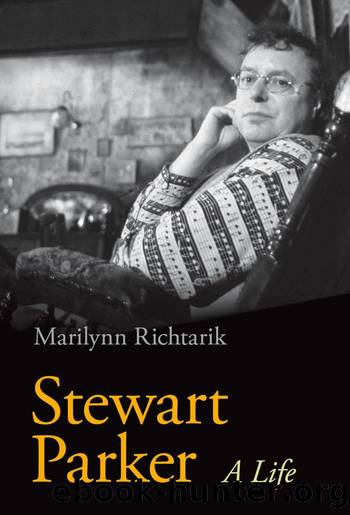Stewart Parker by Marilynn Richtarik;

Author:Marilynn Richtarik; [Richtarik;, Marilynn]
Language: eng
Format: epub
ISBN: 9780199695034
Publisher: OxfordUP
Published: 2012-09-15T05:00:00+00:00
11
Leaps of Faith
On 17 May 1980, Stewart Parker noted in his journal the nineteenth anniversary of the amputation of his left leg. âThe same span led up to its lossâso I suppose I now begin a third lifeâ, he wrote: âHereâs good health to it.â His second life had begun abruptly with his cancer diagnosis, but in Hopdance, the novel he wrote about the experience, Parker presents this as preceded by a long period of dissatisfaction and inchoate longing, during which his alter ego suffers under the malign influence of an emotional âcankerâ. Similarly, in the early 1980s, an upheaval in Parkerâs life followed a protracted period of discontent and nervous tension. As his marriage came to seem more an endurance test than a source of renewed strength and his home in Edinburgh less a haven than a proving ground, he seized on his work and the travel it necessitated as a means of escape and diversion. His frequent absences and periodic immersion in the exigencies of production allowed Parker to maintain (though barely at times) his patience with his wifeâs troubles and his own equilibrium. This delicate balance was upset, however, when he fell in love by imperceptible degrees with the wife of a collaborator. This unlooked-for development led to profound changes in Parkerâs life, and the theme of loveâs transforming power features prominently in two plays of the period, Prattâs Fall and Joyce in June.
After the strain of the previous year, 1981 began auspiciously with the news that the radio version of The Kamikaze Ground Staff Reunion Dinner had won a Giles Cooper Award as one of the four best radio plays transmitted by the BBC in 1980.1 Recipients had been chosen from a field of nearly 500 original radio plays, and the panel of judges included the distinguished drama critic Martin Esslin. Sponsored jointly by the BBC and publisher Eyre Methuen, the award entailed, in lieu of a cash prize, publication in a volume with the other winners. Parker, always avid to have his plays in print, probably hoped his inclusion would give him leverage with Methuenâs drama editor, Nick Hern, another of the judges. In any case, he felt proud to have collected âthe hat-trick of prizesâin theatre, TV & radioâ.2
The television version of Kamikaze fared less well. Its transmission, in mid-February, confirmed the reservations of those who had passed on the project. Parkerâs producer friend Rob Buckler, for instance, returning a copy of the radio script to Parker in November 1979, had written, âas I think you suggested from the outset, it isnât really suitable for film.⦠it really is an out-and-out radio playâ.3 Parker had been anxious to write for television again, however, at least in part for the sake of the comparatively large fees television work generated. When he got the chance to remake Kamikaze, he convinced himself of the aesthetic value of the endeavour. He had enjoyed embellishing the script with songs and re-conceptualizing it for a visual medium, and he liked what the actors brought to it.
Download
This site does not store any files on its server. We only index and link to content provided by other sites. Please contact the content providers to delete copyright contents if any and email us, we'll remove relevant links or contents immediately.
The Power of Myth by Joseph Campbell & Bill Moyers(925)
Half Moon Bay by Jonathan Kellerman & Jesse Kellerman(911)
A Social History of the Media by Peter Burke & Peter Burke(879)
Inseparable by Emma Donoghue(844)
The Nets of Modernism: Henry James, Virginia Woolf, James Joyce, and Sigmund Freud by Maud Ellmann(739)
The Spike by Mark Humphries;(719)
A Theory of Narrative Drawing by Simon Grennan(706)
The Complete Correspondence 1928-1940 by Theodor W. Adorno & Walter Benjamin(703)
Ideology by Eagleton Terry;(659)
Bodies from the Library 3 by Tony Medawar(648)
Culture by Terry Eagleton(646)
World Philology by(645)
Farnsworth's Classical English Rhetoric by Ward Farnsworth(641)
A Reader’s Companion to J. D. Salinger’s The Catcher in the Rye by Peter Beidler(614)
Adam Smith by Jonathan Conlin(607)
Game of Thrones and Philosophy by William Irwin(592)
High Albania by M. Edith Durham(591)
Comic Genius: Portraits of Funny People by(581)
Monkey King by Wu Cheng'en(575)
